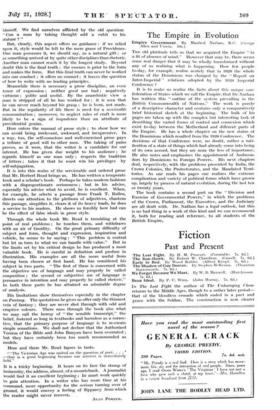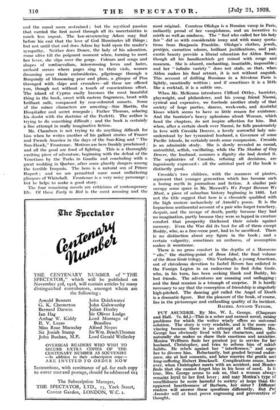Fiction
Past and Present
Butterworth. 7s. 6d.)
Beau Ideal. By P. C. Wren. (John Murray. 7s. 6d.) IN The Lost Fight the author of The Unhurrying Chase returns to the Middle Ages, though to a rather later period— that of the bloodless crusade which ended in a pact and peace with the Soldan. The construction is now clearer
and the mood more restrained ; but the mystical passion that carried the first novel through all its uncertainties is much less urgent. The law-reverencing Adam may find before his end that the love of God illuminates ail things ; but not until that end does Adam lay hold upon the reader's sympathy. Neither does Douce, the lady of his adoration, come alive till the poignant moment when, turning to meet her lover, she slips over the gorge. Colours and songs and shapes of mediaevalism, intercrossing loves and hates, orchard scenes where pages sing to their viols, women dreaming over their embroideries, pilgrimage through a Burgundy of blossoming pear and plum, a glimpse of Pisa thronged with ships and crusaders—all these are offered you, though not without a touch of conscientious effort. The island of Cyprus easily becomes the most beautiful thing in the book, sweet with eastern fragrances, beset with brilliant sails, compassed by rose-coloured sunsets. Some of the minor characters are arresting—Sire Martin, the Hospitaller and secret renegade ; Father Thomas, solacing his doubt with the doctrine of the Perfetti. The author is trying to do something difficult ; and the book is certainly a fine attempt in really imaginative fiction.
Mr. Chambers is not trying to do anything difficult for him when he writes another of his gallant stories of France and French America in the days of the Sun-King and " The Sun-Hawk," Frontenac. Motives are here frankly proclaimed ; and all the good are fond of fighting. This is a thoroughly exciting piece of adventure, beginning with the defeat of the Venetians by the Turks in Gandia and concluding with a great wedding in Quebec, after some ghastly dangers among the terrible Iroquois. The hero is a natural son of Prince Rupert ; and we are permitted some most unflattering glimpses of Whitehall. Frontenac is a very noisy personage ; but he helps to make a good story.
The four remaining novels are criticisms of contemporary life. Of these Early to Bed is the most amusing and the
most original. Countess Olishga is a Russian vamp in Paris, .radiantly proud of her vampishness, and an incentive to mirth as wells madness. The " fool who called her his lady fair " did so with considerable irony and with many quota- tions from Benjamin Franklin. Olishga's clothes, jewels, proteges, carnation odours, brilliant justifications, and pale exotic beauty provide a liberal education for Alden Brent, though all his handkerchiefs get ruined with rouge and mascara. She is absurd, enchanting, insatiable, impossible ; and her " infinite variety " does not stale, so that, when Alden makes his final retreat, it is not without anguish. This account of drifting Russians in a frivolous Paris is lightly, caustically written ; and if sometimes it is a little like a cocktail, it is a subtle one.
When Mr. McKenna introduces Clifford Ottley, barrister, playwright, and philanderer, and his young friend Naomi, cynical and expensive, we forebode another study of that society of large parties, dances, week-ends, and doubtful kisses which seems to have so little reason for existence. And the barrister's heavy aphorisms about Woman, which head the chapters, do not inspire affection for him. But when, after a certain shock over Naomi, he falls passionately in love with Cressida Denver, a lovely sorrowful lady mis- understood by her tyrannical husband, a Governor of some Pacific islands, he certainly needs some compassion. Cressida is an admirable study. She is slowly revealed as casual, untruthful, selfish, vacillating, while the The Shadow of Guy Denver, the husband, assumes a dignity she had denied it. The sophistries of Cressida, refusing- all decisions, are ingeniously expressed : all the satirical part of the book is distinctly good.
Cressida's two children, with the manners of pirates, represent that younger generation which has become such a boring myth in journalism and fiction. A similar pair occupy some space in Mr. Maxwell's We Forget Because We Must, a piece of suburban history beginning in 1895. Let not the title suggest that here is a chronicle qualified with the high austere melancholy of Arnold's poem. It is the loquacious sentimental account of a pair who forgot treachery, despair, and the ravage of death, partly because they had no imagination, partly because they were so lapped in creature comfort that prosperity thickened their minds against memory. Even the War did its best for all of them except Roddy, who, as a free-verse poet, had to, be sacrificed. There is no distinction about any figure in the book ;, and a certain vulgarity, sometimes an archness, of assumption makes it wearisome.
There is no gross comfort in the depths of a Moroccan " silo," the starting-point of Beau Ideal, the final volume of the Beau Geste trilogy. Otis Vanbrugh, a young American, out of chivalrous devotion to Isobel Rivers has enlisted in the Foreign Legion in an endeavour to find John Geste, who, in his turn, has been seeking Hank and Buddy, his lost friends. The adventures are amazing and unflagging ; and the final reunion is a triumph of surprise. It is hardly necessary to say that the conception of friendship is singularly high-pitched. The dancing girl called the Angel of Death is a dramatic figure. But the pleasure of the book, of course, lies in the picturesque and enthralling quality of its incident,
RACHEL ANNAND TAYLOR.





















































 Previous page
Previous page